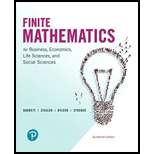
Concept explainers
( A )
To calculate:The probability that the black ball is drawn on the fourth draw and odds for winning if balls are drawn in succession without replacement, until black ball is drawn out of
( B )
To calculate:The amount that the house should pay plus the amount of bet, if the amount of bet for winning when a black ball is drawn on the fourth draw. Also calculate the odds for winning, if balls are drawn in succession without replacement, until a black ball is drawn out of
Want to see the full answer?
Check out a sample textbook solution
Chapter 8 Solutions
Finite Mathematics for Business, Economics, Life Sciences and Social Sciences
Additional Math Textbook Solutions
Basic Business Statistics, Student Value Edition
Thinking Mathematically (6th Edition)
University Calculus: Early Transcendentals (4th Edition)
Introductory Statistics
Precalculus
- Homework Let X1, X2, Xn be a random sample from f(x;0) where f(x; 0) = (-), 0 < x < ∞,0 € R Using Basu's theorem, show that Y = min{X} and Z =Σ(XY) are indep. -arrow_forwardHomework Let X1, X2, Xn be a random sample from f(x; 0) where f(x; 0) = e−(2-0), 0 < x < ∞,0 € R Using Basu's theorem, show that Y = min{X} and Z =Σ(XY) are indep.arrow_forwardrmine the immediate settlement for points A and B shown in figure below knowing that Aq,-200kN/m², E-20000kN/m², u=0.5, Depth of foundation (DF-0), thickness of layer below footing (H)=20m. 4m B 2m 2m A 2m + 2m 4marrow_forward
- 2 Q /showthat Z +4 Z(Z-21) has aɣemovable discontinuity at z = 21.arrow_forward13.4. Let f(z) =y-x-3ir² and y be given by the line segment z = 0 to z 1+i. Evaluate. L f(z)dz.arrow_forwardenter | Infinite Camp ilc 8.3 End-of-Unit Assessment, Op x Pride is the Devil - Google Drive x + 2 sdphiladelphia.ilclassroom.com/assignments/7FQ5923/lesson?card=806642 3 Problem 2 A successful music app tracked the number of song downloads each day for a month for 4 music artists, represented by lines l, j, m, and d over the course of a month. Which line represents an artist whose downloads remained constant over the month? Select the correct choice. = Sidebar Tools M 45 song downloads days d 1 2 3 4 5 6 7 8 00 8 m l RA 9 > КУ Fullscreen G Save & Exit De ☆arrow_forward
- Q/Determine the set of points at which - f(z) = 622 2≥ - 4i/z12 i and differentiable analytice is:arrow_forwardsy = f(x) + + + + + + + + + X 3 4 5 7 8 9 The function of shown in the figure is continuous on the closed interval [0, 9] and differentiable on the open interval (0, 9). Which of the following points satisfies conclusions of both the Intermediate Value Theorem and the Mean Value Theorem for f on the closed interval [0, 9] ? (A A B B C Darrow_forward= Q6 What will be the allowable bearing capacity of sand having p = 37° and ydry 19 kN/m³ for (i) 1.5 m strip foundation (ii) 1.5 m x 1.5 m square footing and (iii)1.5m x 2m rectangular footing. The footings are placed at a depth of 1.5 m below ground level. Assume F, = 2.5. Use Terzaghi's equations. 0 Ne Na Ny 35 57.8 41.4 42.4 40 95.7 81.3 100.4arrow_forward
 Holt Mcdougal Larson Pre-algebra: Student Edition...AlgebraISBN:9780547587776Author:HOLT MCDOUGALPublisher:HOLT MCDOUGAL
Holt Mcdougal Larson Pre-algebra: Student Edition...AlgebraISBN:9780547587776Author:HOLT MCDOUGALPublisher:HOLT MCDOUGAL College Algebra (MindTap Course List)AlgebraISBN:9781305652231Author:R. David Gustafson, Jeff HughesPublisher:Cengage Learning
College Algebra (MindTap Course List)AlgebraISBN:9781305652231Author:R. David Gustafson, Jeff HughesPublisher:Cengage Learning
 Algebra and Trigonometry (MindTap Course List)AlgebraISBN:9781305071742Author:James Stewart, Lothar Redlin, Saleem WatsonPublisher:Cengage Learning
Algebra and Trigonometry (MindTap Course List)AlgebraISBN:9781305071742Author:James Stewart, Lothar Redlin, Saleem WatsonPublisher:Cengage Learning



